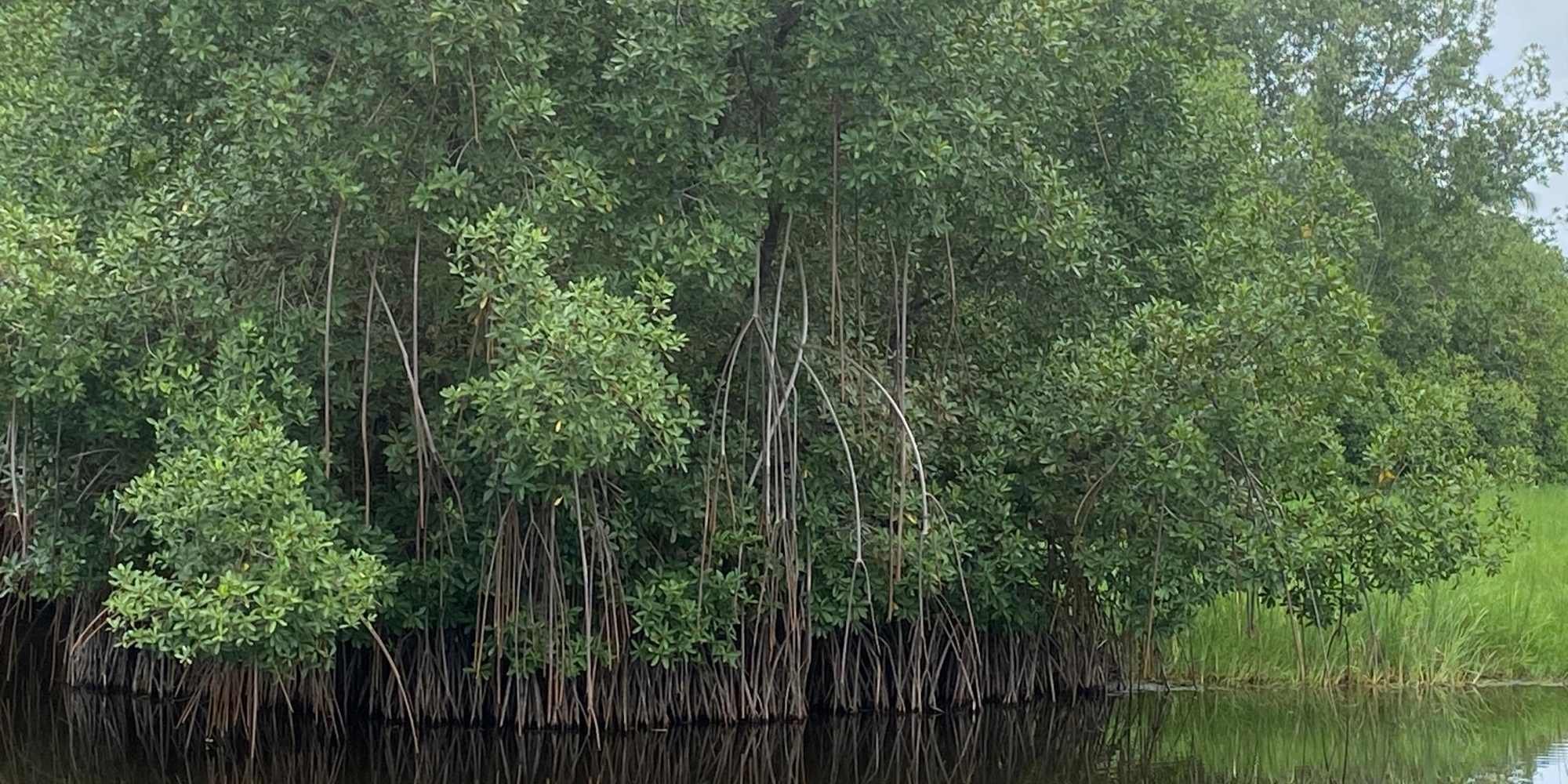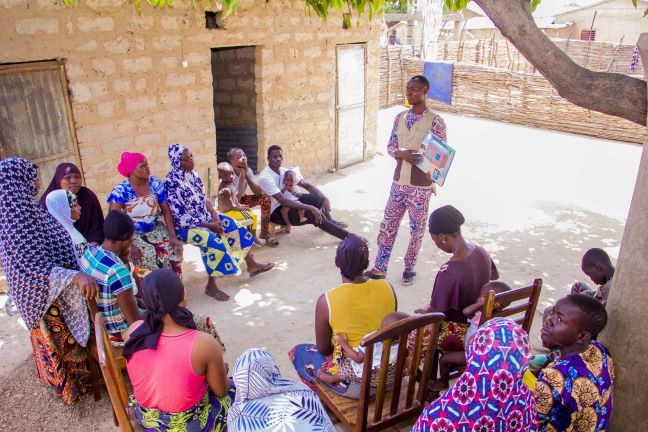In Benin, the disappearance of mangroves is threatening human health
Mangroves mitigate the effects of floods and tidal waves, and also aid in curbing vector-borne diseases like malaria. They’re also vanishing.
- 10 June 2024
- 5 min read
- by Edna Fleure

In Togbin Adouko, a fishing village just a few kilometres from the port city of Cotonou, residents have learned to deeply value mangroves. Gérald Djikpessè, the community area's manager, acknowledges a change in perspective. "We didn't fully grasp the significance of mangroves before. Now we recognise their role in nurturing young fish and combating certain diseases. It's something I only came to understand later."
On one hand, cutting mangroves exposes communities to increased health risks, including malaria, diarrhoea and other communicable diseases. On the other hand, abandoning this traditional practice jeopardises their food security and means of living.
Beyond their aesthetic appeal, these remarkable trees, which grow in brackish water, play a crucial role in mitigating the adverse effects of climate change. They serve as natural barriers against floods, thereby curbing the spread of malaria, diarrhoea, and the numerous other infectious diseases whose spread tends to accelerate around standing water.
Without efforts to restore and safeguard mangroves, public health stands to suffer.
Dr Alexandre Zoumènou, a specialist in health economics, issues a stark warning: "Based on our calculations and estimates, if nothing is done to raise awareness among the population about the urgent need to protect these fragile ecosystems, we are heading towards a catastrophe with an increase in the transmission rate of malaria by 2050." Dr Razaki Ossé, a lecturer and researcher at the University of Benin, echoes his concern, highlighting the heightened vulnerability of coastal populations to climate change.
A dilemma between health and survival
Rachel Olou, aged over 75, remembers a time when mosquitoes were less abundant. Having experienced the loss of a grandson to severe malaria, she now vehemently opposes the cutting down of mangroves: "Since learning about the consequences of mangrove loss, I've taken it upon myself to protect them."

Credit: Edna Fleure
Damien Fandi, who runs a small artisanal salt-production business, acknowledges the challenge of giving up mangroves as fuel. "The real health issue here is malaria, especially during floods when the river overflows. Organisations have urged us to stop cutting mangroves to avoid these health problems. But for our business, this wood is in demand, and useful."
Have you read?
Indeed, mangroves also provide essential resources for food security and the local economy of coastal communities. Their wood, valued for its efficient burning properties, is sought after for various purposes. However, this success comes at a cost: mangroves have lost a quarter of their area in Benin due to excessive exploitation.
Salt production heavily relies on mangroves, leading to the cutting of approximately 20,000 cubic metres of mangrove wood annually. Despite efforts to modernise salt production techniques, women who rely on it as their livelihood prefer the traditional method, which necessitates cutting mangroves for fuel wood.
This dependency on mangroves puts coastal populations in a harsh dilemma. On one hand, cutting mangroves exposes communities to increased health risks, including malaria, diarrhoea and other communicable diseases. On the other hand, abandoning this traditional practice jeopardises their food security and means of living.
At every level, a united front for a common objective
Confronted with this complex situation, the French Global Environment Facility (FFEM) is supporting a pilot project to restore mangrove sites, with the aim of promoting the planting of these invaluable ecosystems to address environmental and health challenges.
Through the FFEM, hundreds of female producers are receiving training about the importance of preserving this vegetation. Traditional religious leaders are also involved, leading to the emergence of "sacred mangroves".
On the path to mangrove restoration, the Beninese government, with the assistance of NGOs, plays a crucial role. Since 2016, the NGO Éco-Bénin has been engaged in repairing the losses and damages in this area. Municipal officials, village chiefs, youth, men and women are participating in planting thousands of mangrove trees, taking on the responsibility of monitoring, maintaining and protecting the seedlings.
On 25 April 2024, Benin initiated its first malaria vaccination campaign for children aged zero to five years. However, this doesn’t mean that precautions can be relaxed. Preserving mangroves remains a critical issue for the health of coastal populations.
On 25 April 2024, Benin initiated its first malaria vaccination campaign for children aged zero to five years. However, this doesn't mean that precautions can be relaxed. Preserving mangroves remains a critical issue for the health of coastal populations.
Christophe Aklé, a surveyor, firmly believes in this. "If necessary, legislation should be enacted to safeguard the health of the most vulnerable. Having worked in a health centre, I've witnessed children succumb to anaemia caused by malaria. While there's now a vaccine and a campaign underway, it doesn't justify ongoing mangrove depletion."
Zacharie Sohou, an oceanographer and director of the Benin Institute of Fisheries Research (IRHOB), echoes these concerns. "The felling of mangroves and the degradation of their ecosystem heighten the risks of rising sea levels, tidal waves, and flooding."
But the hazards extend beyond that. "Moreover, this deforestation adversely affects the health of local communities, subjecting them to harmful smoke emissions that result in respiratory issues and skin burns," the scientist adds.









